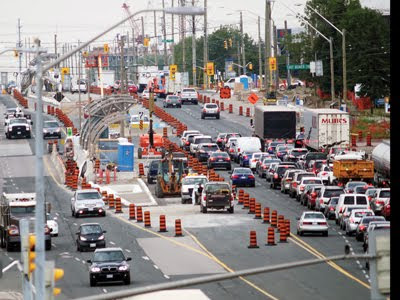Everyday I join 1,000,000 residents of this city and its suburbs to travel to my destination. Whether it is work, school, day care, store, we all have a route and a way to get to our destination. I take the subway. Then I switch to the bus. I spend close to 40 minutes door to door. Recently I spend more time on the bus, because there is construction. You see they are building a bus rapid transit system in the middle of Highway 7. Although, the road is open and operating, but due to separating the construction site: the workers, the tools, and the machinery, from the rest of the road, there is traffic and cars move very slowly. The 40 minutes travel time takes 50% more. I spend roughly 20 more minutes in the bus each way. If I produced 7 units of work each day, my productivity level dips to 6.6 units of work. That's if I don't adjust my arrival to and departure from work times to make up for the lost time. This is just one of the impacts of changing the surface transit operation to address the increase in usage. One can only imagine that the impact is much larger to local community that need shop, play and live there.
What I am living day in and day out, happens as a result of population growth in an urban area. The existing transportation system is not able to meet the demand. Therefore expansion of the roads become necessary but this comes at the cost of severely disrupting the life of the local community.
If money was abundant we would finish such projects in a week or two. In reality, however, the timeline is around two to four years. The thought of having the construction workers in the backyard for that long of a time, even makes the most easy-going people cringe.
What are some of the strategies to reduce the negative impacts of
road expansion projects?
This is one of the three questions in the "Global Engineering Innovation Challenge".
" How can we balance the
needs of surface transit operations, drivers, cyclists and pedestrians
that use streets with limited right-of-way, safer, faster and more
reliable, in a way that is acceptable to the local community?"

No comments:
Post a Comment